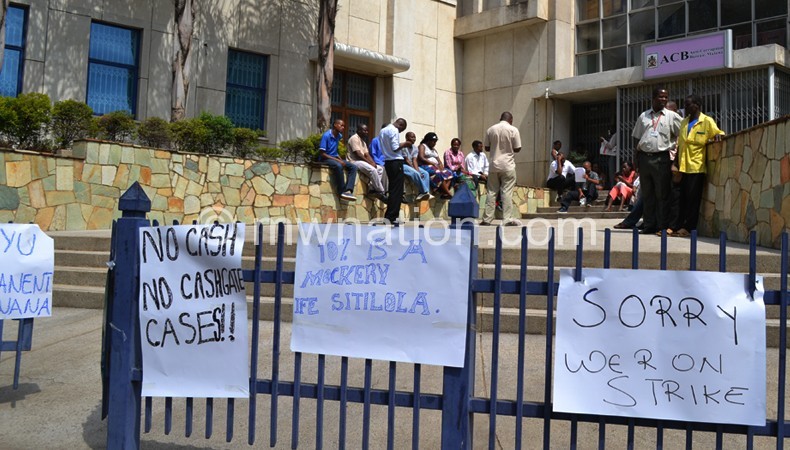Salary uniformity complete—Govt
While the Judiciary is still against harmonisation of salaries in public service, government has disclosed that the process was already dealt with in the 2014/15 financial year.
Ministry of Finance, Economic Planning and Development spokesperson Nations Msowoya disclosed in a response to a questionnaire on Wednesday that in addition to a clean wage bill implemented five years ago, government also finalised the harmonisation of salaries in the public service.
Msowoya said, among other things, the process has helped to eliminate allowances that were distorting the payroll structure.
But the Judiciary, which has been against harmonisation of salaries—as, according to them—it was going to negatively affect what its officers earn currently, said it is not aware that public service salaries were already harmonised.

In an interview on Wednesday, Judiciary spokesperson Mlenga Mvula said salaries and benefits for judicial officers are guided by the law and any move to tamper with that would be against the law and, therefore, illegal.
He said the Judiciary, which accepted a 22 percent pay hike in May this year for judges and magistrates against a demand of 110 percent rise, believed the Executive was still open for negotiations.
Msowoya said as far as Treasury is concerned, they were not aware of any outstanding issues, but that issues of salaries are revolving and there could be some people with issues.
He said while government was working on harmonisation, they also considered recognition of special skills of workers such as judges and doctors. Msowoya said, largely, the harmonisation process has seen people with the same qualifications and doing similar jobs, receiving harmonised salaries, thereby removing disparities that were creating undue differences between services within the public sector.
“The harmonisation of salaries was dealt with in the 2014/15 financial year. Remember, this is the year when government implemented the harmonised changes in the payroll.
“The changes entail that people of the same qualification, same grade and doing similar work getting paid the same salary regardless of which service they are in,” said Msowoya.
He said people working in institutions such as the Judiciary and Parliament are part of the harmonised salary structure.
Msowoya said judicial officers, who include judges, magistrates and registrars, were treated differently from support staff.
He admitted that there were challenges that were experienced last year during implementation of the harmonised salary structure, referring to industrial actions that erupted in institutions such as Parliament, Anti-Corruption Bureau (ACB) and University of Malawi after government hiked salaries for mainstream civil servants.
Mvula said the Judiciary had an impression that government would go back to them on the unresolved issues other than pretending that all is well and issues were resolved.
Mvula said: “Simply put, there were no consultations. Whatever happens, we are going to challenge in court anything we find to be illegal. There are legal frameworks that are supposed to be looked into if any changes are going to be made. In any case, we are waiting to hear from government on the matter.

“But we still wonder on what grounds the Executive would go ahead to harmonise the salaries. Judicial officers in Malawi are the least paid in the Southern African Development Community (Sadc) region. We have always said it that people may have same qualifications, but the field the Judicial officers work in, has own risks.
“This is a field where judicial officers face criminals and they risk their lives and a field where the officers should never be tempted to take bribes owing to low perks.
“Section 42 (2) of the Judiciary’s Conditions of Service stipulates that “whenever there is a general increase in salaries and allowances in the civil service, the salaries and allowances for judicial officers shall correspondingly be increased”.
Meanwhile, Parliament secretariat, which also had issues with the Executive when salary harmonisation was topical early this year, seems to have won its battle.
Speaker of Parliament Richard Msowoya said in an interview on Friday that the issues regarding salaries were amicably resolved.
Another government institution, Anti-Corruption Bureau (ACB), which also had issues with government, was elusive on whether it has benefited from the said salary harmonisation.
ACB senior public relations officer Egrita Ndala said on Friday it was too early to be talking about this, especially at a time the institution has been hit by a tragedy following the murder of one of its senior officers. She also said it was too early to start talking about salaries now, when the financial year has just started.
ACB employees went on strike early this year and only returned to work after receiving a nine percent pay hike in May against a 70 percent they demanded. n






Threat, corruption and other grounds raised by Judiciary and ACB are irrational. Being give a better salary does not deter one to be corrupt. Research informs that the most corrupt persons are those who are rich. What makes one not to be corrupt is that ability one has to resist and refuse to accept bribes. How many judges in Malawi since 1890 has been killed. People working with judiciary such Mlenga Mvula need to be rational being. They should stop fantasizing. His argument is too speculative rather than being based on empirical evidence. Government should proceed with its system which is based on egalitarian value rather following the capitalist Mlenga Mvula.